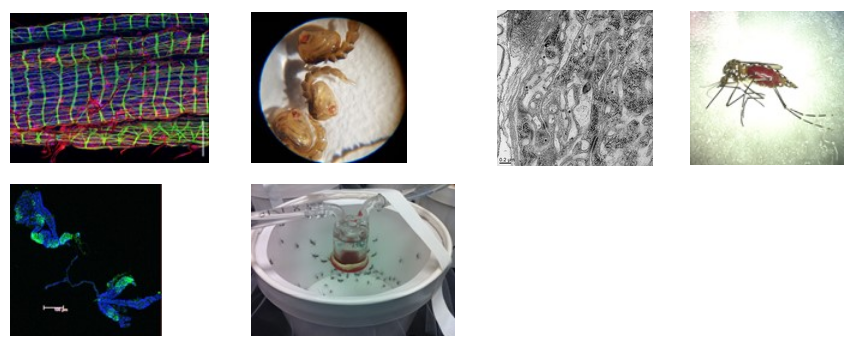Associate Professor
- BS: Christian-Albrechts-University, Kiel Germany
- Ph.D.: Christian-Albrechts-University, Kiel Germany
- Postdoctoral Fellowships: Plant Research International, Wageningen, Netherlands; Purdue University, IN; Colorado State University, CO

Building Address: 303 Connaway Hall
Phone Number: (573) 884-2635
Email: franza@missouri.edu
RESEARCH INTERESTS
The research work in my laboratory focuses on the molecular interactions of arthropod-borne (arbo)viruses such as dengue, chikungunya, LaCrosse, Mayaro, and Zika viruses with the mosquitoes Aedes aegypti and Ae. albopictus. These mosquito-borne viruses are important human pathogens, some of which have been responsible for recent explosive disease outbreaks throughout the tropical regions of the world.
Our goal is to understand the molecular basis of mosquito vector competence for arboviruses to develop novel strategies aiming at interrupting the viral disease cycle in the insect. One research effort has focused on the mosquito’s innate RNA interference (RNAi) pathway and its manipulation to block arbovirus replication in relevant mosquito tissues. An important tool for this research is the germline transformation of mosquitoes. As a result, we generated transgenic Ae. aegypti lines that are inheritably refractory to either dengue 2 virus or Zika virus. Supported by funding from NIH, we are exploring other antiviral effector designs based on modified catalytic RNAs and enhanced antiviral sensors. In addition, we are developing and optimizing single-component and split gene drive systems for Ae. aegypti based on CRISPR/Cas9 technology to potentially drive antiviral effectors through mosquito populations.
Another research project addresses a long-standing question in arbovirology/vector biology: how do arboviruses traverse the tissue (organ) barriers in their insect vectors? Specifically, we are looking at the mechanism(s) underlying the dissemination of arboviruses from the midgut of Ae. aegypti. Observations with chikungunya virus ( Togaviridae), and Zika virus ( Flaviviridae) indicate that the midgut basal lamina acts as a barrier for the viruses and becomes permissive after bloodmeal ingestion, allowing virions to exit the midgut. Enzymatic activity is likely required to facilitate extracellular matrix rearrangements, which affect the midgut permissiveness for the viruses.
This research has now been extended to investigate the mechanism(s) underlying efficient transovarial transmission of particular arboviruses (such as LaCrosse virus; Peribunyaviridae) in certain mosquito species. Our laboratory has obtained funding from NIH to pursue this exciting research project.

TEACHING
Course Director for the undergraduate degree course V_PBIO 3554-01 “Introduction to Virology”; Lecturer for the course V-PBIO 5554-01 “Veterinary Virology” for veterinarians.
SELECTED PUBLICATIONS
- Cui, Y., Behura S.K., Franz, A.W.E. (2022).Cellular diversity and gene expression profiles in the male and female brain of Aedes aegypti. BMC Genomics; 23(1), 119.
- Reid, W.R., Lin, J., Williams, A.E., Juncu, R., Olson, K.E., Franz, A.W.E. (2021). Genomic insertion locus and Cas9 expression in the germline affect CRISPR/Cas9-based gene drive performance in Aedes aegypti. BioRxiv 2021.12.08.471839; doi: https://doi.org/10.1101/2021.12.08.47183 .
- Herd, C.S, Grant, D.G., Lin, J., Franz, A.W.E. (2021). Starvation at the larval stage increases the vector competence of Aedes aegypti females for Zika virus. PLoS Neglected Tropical Diseases; 15(11), e0010003.
- Sanchez-Vargas, I., Williams, A.E., Franz, A.W.E. , Olson, K.E. (2021). Intrathoracic Inoculation of Zika virus in Aedes aegypti. Bio-protocol; 11(18), e4165 .
- Reid, W.R., Olson, K.E., Franz, A.W.E. (2021). Current effector and gene drive developments to engineer arbovirus-resistant Aedes aegypti (Diptera: Culicidae) for a sustainable population replacement strategy in the field. Journal of Medical Entomology ; 58(5), 1987-1996 [ Invited Paper ].
- Cui, Y., Franz A.W.E. (2020). Heterogeneity of midgut cells and their differential responses to blood meal ingestion by the mosquito, Aedes aegypti. Insect Biochemistry & Molecular Biology , 103496 .
- Williams, A.E., Sanchez-Vargas, I., Reid, W.R., Lin, J., Franz, A.W.E. , Olson, K.E. (2020). T he antiviral small-interfering RNA pathway induces Zika virus resistance in transgenic Aedes aegypti. Viruses 12, 1231 .
- Cui, Y., Liu, P., Mooney, B.P., Franz, A.W.E. (2020). Quantitative proteomic analysis of chikungunya virus-infected Aedes aegypti reveals proteome modulations indicative of persistent infection. Journal of Proteome Research, 19(6), 2443-2456.
- Williams, A.E., Franz, A.W.E., Reid, W.R., Olson, K.E. (2019). Anti-viral effectors and gene drive strategies for mosquito population suppression or replacement to mitigate arbovirus transmission by Aedes aegypti. Insects 11(1), 52.
- Cui, Y., Grant, D.G., Lin J., Yu, X., Franz, A.W.E. (2019). Zika virus dissemination from the midgut of Aedes aegypti is facilitated by bloodmeal-mediated structural modification of the midgut basal lamina. Viruses 11(11), pii: E1056.
- Kantor, A.M., Lin, J., Wang, A., Thompson D.C., Franz, A.W.E. (2019). Infection pattern of Mayaro virus in Aedes aegypti (Diptera: Culicidae) and transmission potential of the virus in mixed infections with chikungunya virus. Journal of Medical Entomology 56(3), 832-843 .
- Kantor, A.M., Grant, D.G., Balaraman, V., White, T.A., Franz, A.W.E. (2018). Ultrastructural analysis of chikungunya virus dissemination from the midgut of the yellow fever mosquito, Aedes aegypti. Viruses 10, 571.
- Sheridan, M.A., Balaraman, V., Schust, D.J., Ezashi, T., Roberts, R.M., Franz, A.W.E. (2018). African and Asian strains of Zika virus differ in their ability to infect and lyse primitive human placental trophoblast. PLoS One 13(7):e0200086.
- Dong, S., Balaraman, V., Kantor, A.M., Lin J., Grant, D.G., Held, N.L., Franz, A.W.E. (2017). Chikungunya virus dissemination from the midgut of Aedes aegypti is associated with temporal basal lamina degradation during bloodmeal digestion. PLoS Neglected Tropical Diseases 11(9): e0006976.
- Dong, S., Behura, K.S., Franz, A.W.E. (2017). The midgut transcriptome of Aedes aegypti fed with saline or protein meals containing chikungunya virus reveals genes potentially involved in viral midgut escape. BMC Genomics 18: 382.
- Sheridan, M.A., Yunusov, D., Balaraman, V., Alexenko, A.P., Yabe, S., Verjovski-Almeida, S., Schust, D.J., Franz, A.W ., Sadovsky, Y., Ezashi, T., Roberts, R.M. (2017). Vulnerability of primitive human placental trophoblast to Zika virus. Proc Natl Acad Sci U S A. 114(9):E1587-E1596.
- Kantor, A.M., Dong, S., Held, N.L., Ishimwe, E., Passarelli, A.L., Clem, R.J., Franz, A.W.E. (2017). Identification and initial characterization of matrix metalloproteinases in the yellow fever mosquito, Aedes aegypti. Insect Molecular Biology 26 (1), 113-126.
- Dong, S., Kantor, A.M., Lin, J., Passarelli, A.L., Clem, R.J., Franz, A.W.E. (2016). Infection pattern and transmission potential of chikungunya virus in two New World laboratory-adapted Aedes aegypti strains. Scientific Reports 6: 24729.
- Olson, K.E. and Franz, A.W.E. (2016). Genetically Modified Vectors for Control of Arboviruses. In: ‘Nikolaos Vasilakis and Duane Gubler, (eds.), Arboviruses: Molecular Biology, Evolution and Control’, Caister Academic Press, Norwich, U.K., 398 pp.
- Franz, A.W.E. , Kantor, A.M., Passarelli, A.L., Clem R.J. (2015). Tissue barriers to arbovirus infection in mosquitoes. Viruses 7(7), 3741-3767.
- Olson, K.E. and Franz, A.W.E. (2015). Advances in genetically modified Aedes aegypti to control transmission of dengue viruses. Future Virology 10(5), 609-624.
- Dong, S., Lin, J., Held, N.L., Clem, R.J., Passarelli, A.L., Franz, A.W.E. (2015). Heritable CRISPR/Cas9-mediated genome editing in the yellow fever mosquito, Aedes aegypti. PLoS One 10(3): e0122353.
- Franz, A.W.E. , Balaraman, V., Fraser, M.J. (2015). Disruption of dengue virus transmission by mosquitoes. Current Opinion in Insect Science 6, 1-9 .